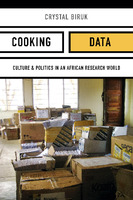Cooking Data
Culture and Politics in an African Research World
Author(s)
Biruk, Crystal
Collection
Knowledge Unlatched (KU)Number
101006Language
EnglishAbstract
COOKING DATA is an ethnographic study of how demographic data is collected, handled, processed, and manipulated by fieldworkers, researchers, policymakers, and NGOs in Malawi and internationally. Crystal Biruk’s fieldwork with people at all levels of major survey projects explores how survey-based research projects call truths about the populations they work with into being, transforming data from answers to survey questions into statistics that appear self-evidently true. Beginning with the assumption that clean data is a myth, Biruk uncovers the hidden relationships between the knowledge work that produces data and its value to various audiences. Specifically, her work considers how health-related data have become financially valuable both to NGOs and to the young Malawians who work as data collectors and, later, supervisors--and how the commodification of health information intersects with local social worlds.


 Download
Download